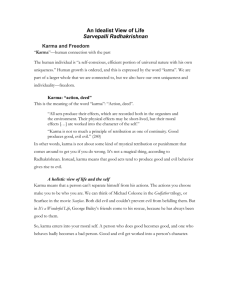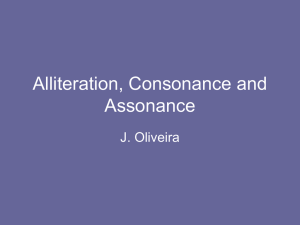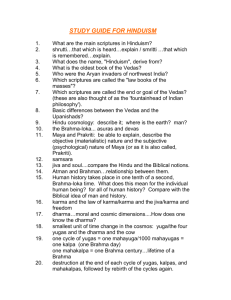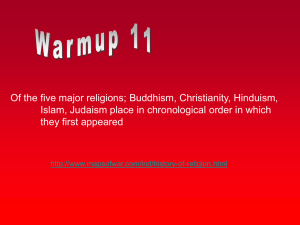Some Karma Definitions
advertisement
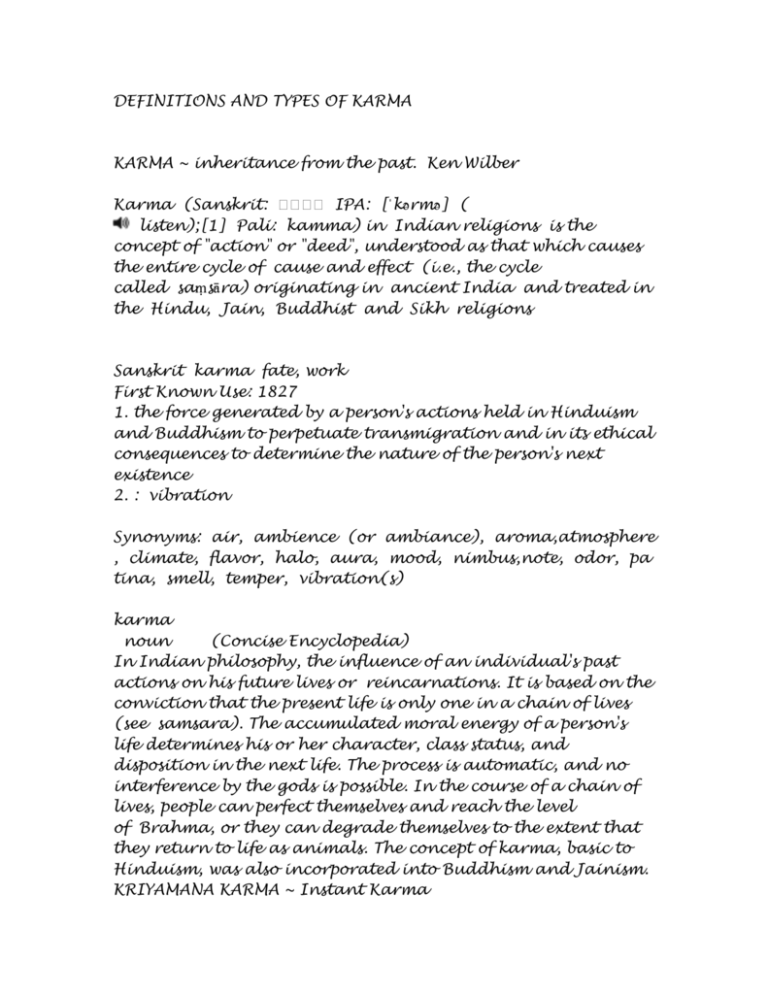
DEFINITIONS AND TYPES OF KARMA KARMA ~ inheritance from the past. Ken Wilber Karma (Sanskrit: कककक IPA: [ˈkərmə] ( listen);[1] Pali: kamma) in Indian religions is the concept of "action" or "deed", understood as that which causes the entire cycle of cause and effect (i.e., the cycle called saṃsāra) originating in ancient India and treated in the Hindu, Jain, Buddhist and Sikh religions Sanskrit karma fate, work First Known Use: 1827 1. the force generated by a person's actions held in Hinduism and Buddhism to perpetuate transmigration and in its ethical consequences to determine the nature of the person's next existence 2. : vibration Synonyms: air, ambience (or ambiance), aroma,atmosphere , climate, flavor, halo, aura, mood, nimbus,note, odor, pa tina, smell, temper, vibration(s) karma noun (Concise Encyclopedia) In Indian philosophy, the influence of an individual's past actions on his future lives or reincarnations. It is based on the conviction that the present life is only one in a chain of lives (see samsara). The accumulated moral energy of a person's life determines his or her character, class status, and disposition in the next life. The process is automatic, and no interference by the gods is possible. In the course of a chain of lives, people can perfect themselves and reach the level of Brahma, or they can degrade themselves to the extent that they return to life as animals. The concept of karma, basic to Hinduism, was also incorporated into Buddhism and Jainism. KRIYAMANA KARMA ~ Instant Karma AGAMI KARMA~ Delayed Karma SANCHITA KARMA~ Karma from past lives PRARABHA KARMA~ Karma that is postulated to be the amount you can work off in one life Nishkam Karma, or self-less or desireless action is an action performed without any expectation of fruits or results, and the central tenet of Karma Yoga path to Liberation, which has now found place not just in business management, management studies but also in promoting better Business ethics as well [1]. Its modern advocates press upon achieving success following the principles of Yoga [2], and stepping beyond personal goals and agendas while pursuing any action over greater good [3][4][5], which has become well known since it is the central message of the Bhagavad Gita [6]. In Indian philosophy, action or Karma has been divided into three categories, according to their intrinsic qualities or gunas. Here Nishkam Karma belongs to the first category, theSatvik (pure) or actions which add to calmness; the Sakam Karma (Self-centred action) comes in the second rājasika (aggression) and Akarma (in-action) comes under the third,tāmasika which correlates to darkness or inertia [7]. Sakam Karma (Attached Involvement) or actions done with results in mind. Nishkam Karma, gets an important place in the Bhagavad Gita, the central text of Mahabharata [16], where Krishna advocates 'Nishkam Karma Yoga' (the Yoga of Selfless Action) as the ideal path to realize the Truth. Allocated work done without expectations, motives, or thinking about its outcomes tends to purify one's mind and gradually makes an individual fit to see the value of reason and the benefits of renouncing the work itself. These concepts are vividly described in the following verses: To action alone hast thou a right and never at all to its fruits; let not the fruits of action be thy motive; neither let there be in thee any attachment to inaction. - Verse 47, Chapter 2-Samkhya theory and Yoga practise, The Bhagavadgita [17][18] "Fixed in yoga, do thy work, O Winner of wealth (Arjuna), abandoning attachment, with an even mind in success and failure, for evenness of mind is called yoga" - Verse 2.48[19] "With the body, with the mind, with the intellect, even merely with the senses, the Yogis perform action toward selfpurification, having abandoned attachment. He who is disciplined in Yoga, having abandoned the fruit of action, attains steady peace..." - Verse 5.11[20] Consequentialism From Wikipedia, the free encyclopedia Consequentialism is the class of normative ethical theories holding that the consequences of one's conduct are the ultimate basis for any judgment about the rightness of that conduct. Thus, from a consequentialist standpoint, a morally right act (or omission) is one that will produce a good outcome, or consequence.[citation needed] Consequentialism is usually distinguished from deontological ethics (or deontology), in that deontology derives the rightness or wrongness of one's conduct from the character of the behaviour itself rather than the outcomes of the conduct. It is also distinguished from virtue ethics, which focuses on the character of the agent rather than on the nature or consequences of the act (or omission) itself, and pragmatic ethics which treats morality like science: advancing socially over the course of many lifetimes, such that any moral criterion is subject to revision. Consequentialist theories differ in how they define moral goods.[citation needed] Some argue that consequentialist and deontological theories are not necessarily mutually exclusive. For example, T.M. Scanlon advances the idea that human rights, which are commonly considered a "deontological" concept, can only be justified with reference to the consequences of having those rights.[1] Similarly, Robert Nozick argues for a theory that is mostly consequentialist, but incorporates inviolable "sideconstraints" which restrict the sort of actions agents are permitted to do.[1] Negative consequentialism Most consequentialist theories focus on promoting some sort of good consequences. However, one could equally well lay out a consequentialist theory that focuses solely on minimizing bad consequences. (Negative utilitarianism is an actual example.) One major difference between these two approaches is the agent's responsibility. Positive consequentialism demands that we bring about good states of affairs, whereas negative consequentialism may only require that we avoid bad ones. A more strenuous version of negative consequentialism may actually require active intervention, but only to prevent harm from being done. An alternative theory (using the example of negative utilitarianism) is that some consider the reduction of suffering (for the disadvantaged) to be more valuable than increased pleasure (for the affluent or luxurious).[citation needed] [edit] Teleological ethics Teleological ethics (Greek telos, “end”; logos, “science”) is an ethical theory that holds that the ends or consequences of an act determine whether an act is good or evil. Teleological theories are often discussed in opposition to deontological ethical theories, which hold that acts themselves are inherently good or evil, regardless of the consequences of acts.[citation needed] Acts and Omissions, and the 'Act and Omissions Doctrine' Since pure consequentialism holds that an action is to be judged solely by its result, most consequentialist theories hold that a deliberate action is no different from a deliberate decision not to act. This contrasts with the Acts and Omissions Doctrine, which is upheld by some medical ethicists and some religions: it asserts there is a significant moral distinction between acts and deliberate non-actions which lead to the same outcome. This contrast is brought out in issues such as voluntary euthanasia - a pure consequentialist would see no moral difference between allowing a patient to die by, for example, withholding food; switching off their life-support machine; or actively killing them with harmful drugs. [edit] The Ultimate end is a concept in the moral philosophy of Max Weber, in which individuals act in a faithful, rather than rational, manner.[citation needed] We must be clear about the fact that all ethically oriented conduct may be guided by one of two fundamentally differing and irreconcilably opposed maxims: conduct can be oriented to an "ethic of ultimate ends" or to an "ethic of responsibility." This is not to say that an ethic of ultimate ends is identical with irresponsibility, or that an ethic of responsibility is identical with unprincipled opportunism. Naturally nobody says that. However, there is an abysmal contract between conduct that follows the maxim of an ethic of ultimate ends— that, is in religious terms, "the Christian does rightly and leaves the results with the Lord"—and conduct that follows the maxim of an ethic of responsibility, in which case one has to give an account of the foreseeable results of one's action." [edit] King James Translation of Galatians: 6:7 Be not deceived; God is not mocked: for whatsoever a man sows, that shall he also reap. King James Translation of Proverbs 23:7 For as he thinketh in his heart, so is he: Eat and drink, saith he to thee; but his heart is not with thee.


